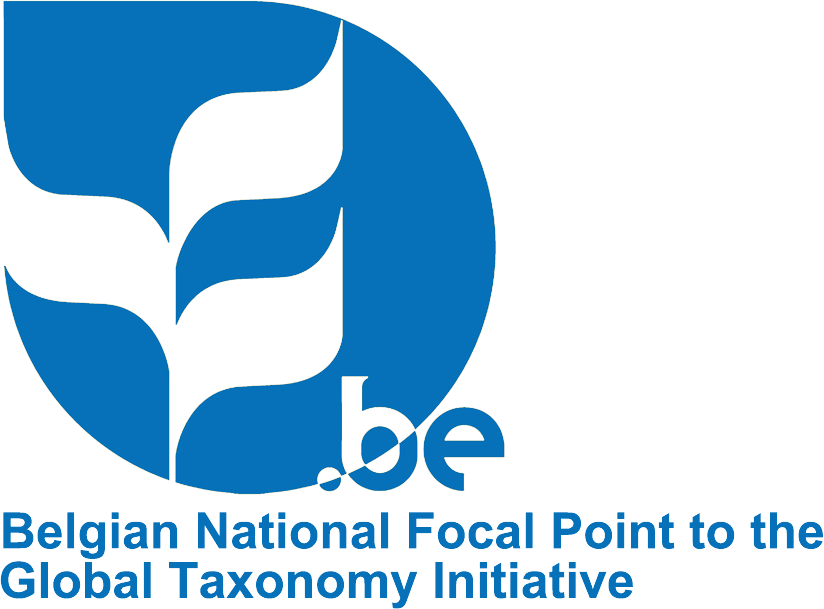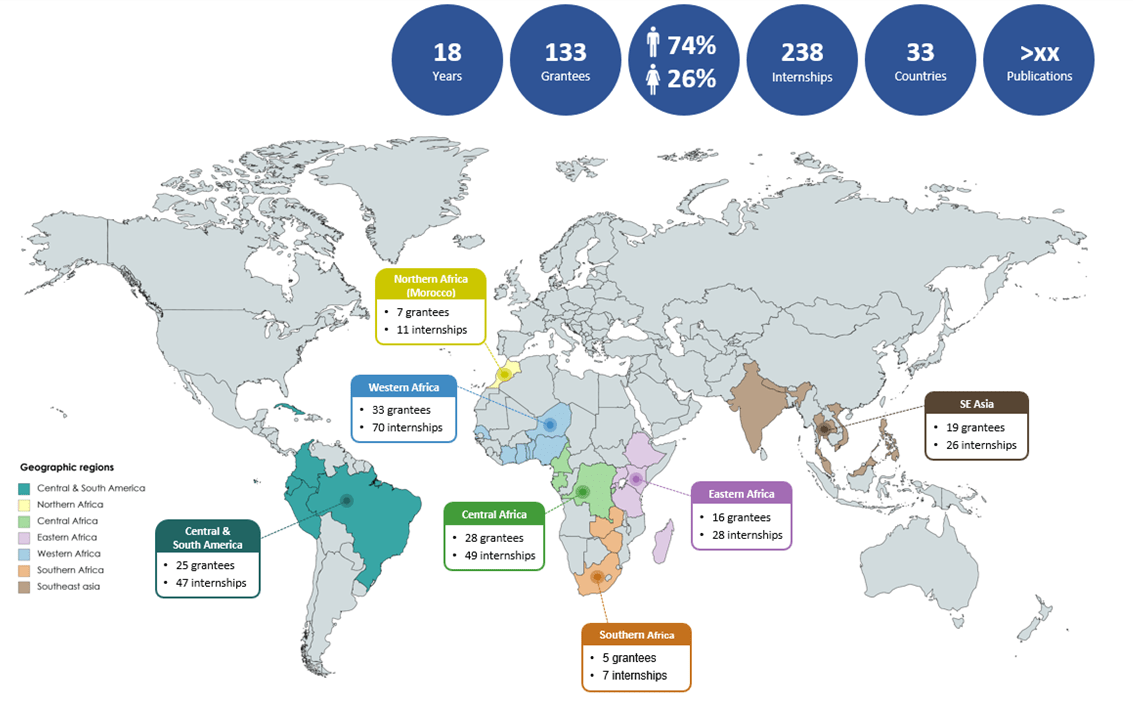GTI Short-term Scholarships
Since 2004, through annual grants, the Belgian National Focal Point (NFP) for the Global Taxonomy Initiative (GTI) has been facilitating short-term taxonomic training in Belgium for researchers and students from partner countries of the Belgian Development Cooperation.
These training programs provide access to Belgian expertise in taxonomy and conservation, as well as to the extensive collections of Belgian institutes.
Home » Specific Training » Short-term Scholarships
About the Short-term Scholarship Grant
The GTI Scholarships fund short-term research stays (up to 5 weeks) of individual master or doctoral degree students or scientists from eligible developing countries at a Belgian center of taxonomic expertise (e.g., Royal Belgian Institute of Natural Sciences, Meise Botanic Garden, AfricaMuseum , a specific university research group or another taxonomic facility).
The internships are focused on (a) specific taxonomic group(s) relevant to sustainable ecosystem management and sustainable local livelihoods – it may concern plants, animals, fungi, bacteria or other (micro)organisms – and typically include combined theoretical and hands-on training in taxon identification, taxon classification and/or collection management.
Access to scientific literature, to specialized databases and to specific Belgium-based infrastructure and collections can also be obtained during the study visits.
Grants awarded in the past
During the period 2004-2021, 133 different interns from 33 countries received at least 1 GTI Short-term Scholarship (238 grants awarded in total)
General eligibility criteria for 2024-2025
Regarding the study object of the projects, organisms of all taxa are generally accepted (plants, animals, fungi, bacteria or other (micro)organisms), as long as it concerns extant taxa. However, the overarching theme of the call may vary from year to year (e.g., related to One Health, conservation biology, etc.). Proposals may involve traditional methods, molecular and other new techniques, or a combination of both.
For the 2024-2025 call, participants must specify how their research addresses the links between biodiversity, water, food, climate, and/or health (nexus).
As for the candidates, they must be a citizen of one of the following countries:
Benin* – Burkina Faso* – Burundi* – Cabo Verde – Cambodia – Cote d’Ivoire – DR Congo* – Gambia – Ghana – Guinea* – Guinea Bissau – Kenya – Laos – Liberia – Mali* – Morocco* – Mozambique* – Niger* – Nigeria – Palestinian Territory* – Senegal* – Sierra Leone – Tanzania* – Thailand – Togo – Uganda* – Vietnam.
Candidates from official partner countries of the Belgian Development Cooperation (indicated with an asterisk in the above list) will be given priority, even more so if they are associated with a scientific institute with which CEBioS/the Belgian GTI-NFP has a privileged relationship (institutional cooperation). These institutes are:
- Université d’Abomey-Calavi (UAC, Bénin);
- Institut de Recherches Halieutiques et Océanologiques du Bénin (IRHOB);
- University of Parakou (Bénin);
- Office Burundais pour la Protection de l’Environnement (OBPE, Burundi);
- Centre de Surveillance de la Biodiversité (CSB, DR Congo).
Additionally, applicants should be able to answer “yes” to the following questions:
- Does your project contain clear taxonomic components (e.g., taxonomic revisions, elaboration of checklists/guides/identification keys, biodiversity assessments/monitoring, …)?
- Does your project address key taxonomic gaps/take into account priority taxonomic needs of your country or region?
- Does your project aim at building taxonomic expertise and advancing research in your country or region?
- Does your research contribute to the conservation of biodiversity and/or ecosystem services in your country or region?
- Does your research contribute to improving livelihoods of local communities in your country or region (in the medium or long term, directly or indirectly)?
- Does your work support the achievement of the UN Sustainable Development Goals (SGDs) and the targets of the post-2020 Global Biodiversity Framework established in the context of the Convention on Biological Diversity?
- Is there an expert working on your taxa at a Belgian scientific institute (Royal Belgian Institute of Natural Sciences, Meise Botanic Garden, AfricaMuseum, a specific university research group or another taxonomic facility)?
- Are there any collections of your taxa held by a Belgian scientific institution?
- Are you under the age of 45?
- Do you hold – at least – a Bachelor degree?
- Are you currently affiliated with a university or an official research institute in an eligible country (as a Master’s or doctoral student)?
- Do you plan to disseminate your work (poster, publication, diploma, oral communication at conference, …)?
Applicants who have already completed 3 stays in Belgium in the framework of the External GTI call can no longer apply.
Applications from women
Applications from women are strongly encouraged. CEBioS will ensure that several women are selected. CEBioS stresses the importance of targeting a female audience in this call, particularly in the scientific field where women remain under-represented. By selecting a significant number of female candidates, CEBioS aims to enrich research through a diversity of perspectives and to promote greater inclusion in science.
Application documents
You must fill in the official online form, which is available in English and French, to complete your project proposal.
For your application to be complete, please also provide the following documents to cbd-gti@naturalsciences.be :
- a proof of registration or affiliation to a university (a proof of registration of the current year in a university (Master/Thesis) for students or a proof of membership in a research laboratory for teachers/researchers)
- recent CV
- picture
- proof of your tutor’s agreement to host you during the chosen period
- a letter of recommendation from a tutor or supervisor at your national institute/university/lab
Tutors
It is recommended that candidates already specify and contact an expert working on their taxa at a Belgian institute. For example, a copy of the email exchange with the expert, showing his/her willingness to provide a taxonomic training in case of acceptance of the project, can be attached.
Prior to the call, CEBioS published a non-exhaustive list of tutors, along with their specialisations and contact information.
If you would still have unanswered questions or in case of problems with filling out the online application form or contacting a Belgian expert, you can email us at cbd-gti@naturalsciences.be.
Key dates
Deadline for applications (closing date): 31 October 2024
Please note that it is only possible to apply when the calls are open.
Selection results: November 2024
Dates of the internship in Belgium (flexible to a few days):
The internship period will cover 5 weeks to be determined between 10 March 2025, and 27 April 2025. If this period does not suit you at all, please let us know.
Selected candidates will have the opportunity to return to Belgium for a second internship in 2026, subject to relevance and a positive evaluation of the first internship.
Reporting
Within one month after the end of the training, an internship report as well as an evaluation document must be completed by the grantee.
These can be found online:
- Scientific and taxonomic internship report
- Logistical evaluation form
Pictures of the scholarship have to be sent to cbd-gti[at]naturalsciences.be.




